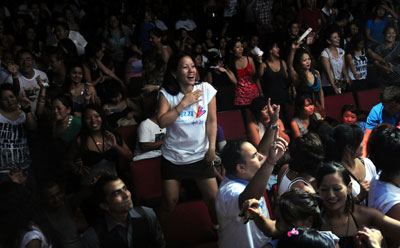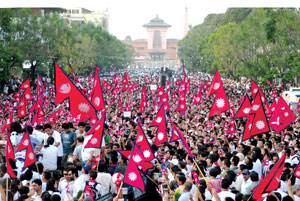 BIKRAM RAI |
"Let me introduce my band members � to my left is Subin on bass, Dhurba on drums �"
In every one of my concerts, I introduce my band members to enormous applause. And as a matter of principle I do not use their surnames. During one of the shows of my Peace Concert Tour of Nepal earlier this year, someone in the audience shouted out:
"Dhurba ... who?"
This was one voice in an audience of thousands, but it was loud enough for me to hear on stage.
I had to respond. "Subin SHAKYA on bass," I said with an emphasis on the surname, "Dhurba LAMA on drums, Niraj GURUNG on guitars, Suraj THAPA on keyboards, Shanti RAYAMAJHI on percussion and I am Amrit GURUNG."
But I went on: "We are all Nepali even though some are trying to divide us by ethnicity, that is why I don't take the surnames of band members. Look at the six of us here on stage, we are Nepal in a microcosm. Some of us have flat noses, others have pointed ones. Some have slit eyes, others have round ones. But that does not stop us from working together as a team. In fact, it helps us create better music. Let us all say we are members of one big Nepali family." The entire hall burst into sustained applause I hadn't heard anywhere else. I couldn't see the person who had shouted out for surnames, his voice had been drowned out.
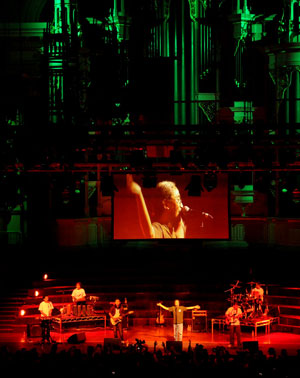 |
I communicate with Nepalis through music on my concert tours. For the past decade my band has been crisscrossing Nepal with the message of peace, justice and national unity. I do this through the cementing role of the Nepali language, the lingua franca that allows Nepalis everywhere to communicate with each other. In between songs, I ask audiences: "I am a Nepali and proud to be one. Are you?" There is a collective and deafening roar: "Yes!"
When I am not on concert tours, I travel across Nepal on foot. From the villages of the far-west to the east, from the Himals to the Tarai, wherever I go, I find food and shelter through my Nepali language. Let us not debate the origin of this language, the reality is that it is one of the few things that weaves our national fabric together, and unites all Nepalis everywhere.
All of us came from somewhere else to live in what is now Nepal, it is futile to debate who settled here first. Time has moved on, but one thing is for sure: none of the other languages, Gurung, Newar, Magar, Bhojpuri, Maithali, Tamang can be a common language. They won't even serve as common languages within the provinces that ethnic groups want to name after their own.
Gurung used to be widely spoken in my home town of Pokhara not only by us Gurungs, but by others as well. Similarly, Newari was spoken widely by all inhabitants of Kathmandu, not just Newars. If we want Nepal to be a strong and prosperous country, we need to spread the unifying message of the Nepali language and Nepali nationhood.
 |
Whenever I speak on these issues during concerts from Syangja to Sydney, from Fikkal to Finland the forceful feedback from the audience gives me confidence that the silent majority of Nepalis feel the same way. It's just that these voices have been sidelined by divisive slogans magnified by the media. All Nepalis I have met, irrespective of their place of domicile, have one thing in common: their common Nepali identity and the pride in being a Nepali first.
Of course, there has been discrimination and exclusion throughout Nepal's history. Some have done better than others. But that does not mean all people from all marginalised groups were completely suppressed. My identity today is based on all people of Nepali origin liking my music, not just the Gurungs.
My friend Nabin Subba became a filmmaker because Nepalis everywhere appreciate his craft, not just because he was liked only by his ethnic group. Madhav Prasad Ghimire, Ambar Gurung, Gopal Yonzon, Bairagi Kainla and Narayan Gopal did not become national figures because they were Bahun, Gurung, Tamang, Limbu or Newar.
The CA can decide to carve up the country in however many pieces it wants, but my appeal is: don't confine me to one part of Nepal. I do not want to be a first class citizen of just one province and feel second class in the rest of the country. I want to feel I am standing on my soil, wherever I stand, from Mechi to Mahakali.
Amrit Gurung is the founder of the Nepali folk rock band, Nepathya.
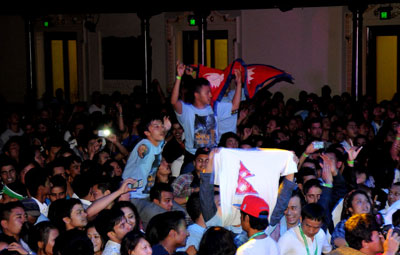 |
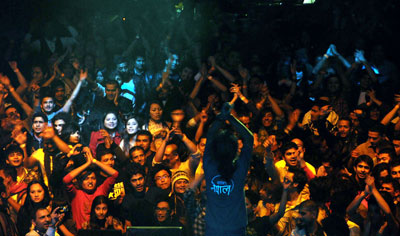 |
|
|
Read also:
Harm reduction
National identity crisis, RUBEENA D SHRESTHA
At a time when we should be valuing our multiple, intersecting identities, we are being told to choose a single, overarching definition of ourselves
May or may not, ANURAG ACHARYA
There is still enough time to forge an agreement if the parties can find room for it.


